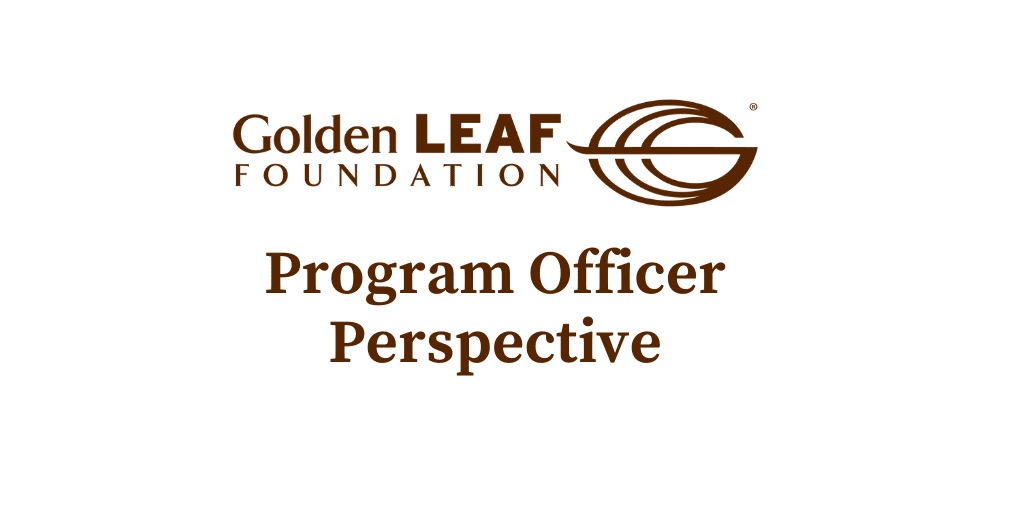
November 17, 2022
Contributed by Brynn Fann, Golden LEAF Program Officer
On September 29th, the NC Chamber of Commerce hosted its annual NC Ag Allies Conference in the McKimmon Center at North Carolina State University. At the conference, speakers discussed many of the pressing issues facing farmers and the agriculture industry locally, across the country, and internationally. I was able to attend with Golden LEAF President, Chief Executive Officer Scott T. Hamilton on behalf of Golden LEAF to listen and learn about issues facing the state’s largest economic driver.
During the opening keynote address, Cory Rosenbusch, President and CEO of the Fertilizer Institute, spoke about many challenges facing farmers, specifically related to the use of fertilizer. With a total of 8.3 million acres of land currently in production across the state, fertilizer plays a big role in creating higher crop yields in order to feed the growing population across the world. Although fertilizer is a key component of agriculture, there are many disruptions facing the fertilizer industry that will have a significant effect on farm practices and production.
In order to adjust and prepare for changes in agriculture practices, it raises the question for me to ask how is the workforce prepared to make these adjustments as needed? Are farmers also in the position to have the available resources to meet these demands as they become more prevalent in the agriculture industry?
The conference also included a panel of public and private representatives in the agriculture sector who discussed workforce diversity. The panel noted that the current workforce is aging out, and the industry needs to begin investing in diverse workers to replace the current workforce. There are currently many fields of study that can support the agriculture sector, but students are not exposed to the idea that agriculture can be for them. I believe this was a very important lesson learned through the lens of diversity in recognizing there are many avenues that can be taken to become a part of the agriculture industry. Encouraging students to change their mindset that agriculture can be for them will be an important factor in sustaining the state’s agriculture industry.
The next duo of speakers discussed the top legal issues that are affecting the agriculture industry. While I was aware that there are many laws and regulations impacting the farmers, it was incredibly interesting to hear and learn more about its impact. For example, the speakers spoke about Proposition 12 – a law passed in California that establishes requirements for confinement of certain farm animals and restricts the sale of pork unless the farm on which the pork is raised meets those standards. The speakers discussed how these standards can have impacts in other areas such as fertilizer use and manure management. Having a better understanding of laws such as these helps me better understand how this directly impacts N.C. farmers. Providing educational opportunities for local farmers to be prepared for these legal challenges is key to ensuring the agriculture industry remains strong throughout the state.
Former U.S. Ambassador to the United Nations Agencies for Food and Agriculture Kip Tom provided the closing keynote speech. Ambassador Tom reviewed many insights into international food issues that the United States will face in the near future. International issues include effects of the European Union’s regulations related to climate change and concerns about global food security. As our population continues to grow and the industry changes, farmers face the unique challenge of meeting global needs while also meeting global regulatory requirements.
Scott shared with me the importance of having global, national, state, and local perspectives on the challenges and opportunities of the agriculture industry. He also pointed out that the concern of available workers is a problem all industries are facing. Scott added that North Carolina in particular is a force to be reckoned with the number of educational institutions and workforce partners working to combat this trend. He also stated that the industry is in good hands with the brilliant minds working on solving current and future needs in agriculture.
At the conference, I was able to learn more than I could imagine about issues facing the agriculture industry. Networking opportunities during the conference showed me just how prevalent all these issues are for farmers as many attendees echoed the same issues that we learned about. For Golden LEAF, we face an opportunity to support the agriculture industry by becoming prepared to face the needs identified in the changing workforce. As the industry experiences these changes in demands, this is an important time to prepare the workforce for these changes to be ready to tackle the challenges and needs to continue to expand the agriculture industry in the state.
To learn more about how Golden LEAF supports the agriculture industry, click here.